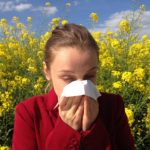Natural Sun Protection
When most people think about sun protection, what comes to mind is either sunscreen or covering up. However, it’s not just what you put on your body that counts; what you put into your body can greatly impact your sun-sensitivity as well.
An antioxidant rich diet can protect the skin from UV rays. Botanical compounds such as catechins and anthocyanins can help strengthen the skins upper layers, increasing resistance to UV rays. Berries and pomegranate are rich in these compounds, as well as dark chocolate and green tea.
There have been a handful of small studies demonstrating the sun protective ability of these foods, including one study which showed that consuming 3 ounces of dark chocolate per day for 6-12 weeks resulted in a 15-25% reduction of skin reddening after exposure to UV light.
Compounds in the carotene family are also sun-protective, including beta-carotene and lycopene, both found in colorful fruits and vegetables, as well as astaxanthin. Astaxanthin is a potent antioxidant found in chlorella, wild salmon, crustaceans such as krill, or can also be taken in supplemental form. It is becoming more well-known as a compound that reduces UV-induced collagen damage and improves skin elasticity and moisture content. It may even help reduce wrinkles, freckles, and age spots.
Sulphoraphanes found in the brassica family vegetables (like broccoli, cabbage, and kale) are well-known liver supportive and cancer reducing compounds, which are also UV protective.
In terms of topical protection, the debate still continues as to how significant the impact of sunscreen is in terms of cancer protection. Since the intent of sunscreen is to protect the skin from sun damage and the risk of skin cancer, it is counter-productive to use chemical-based sunscreens, which may actually increase one’s risk of cancer Seek out sunscreens with all-natural ingredients, which can be just as effective and are much less likely to be harmful to you, your children, and the environment. Check out the Environmental Working Group’s guide to sunscreens, where you can see their health and safety ratings on various sunscreens here.
If you choose not to wear sunscreen, keeping skin moisturized and avoiding soaps that are overly drying will also help buffer the skin from UV rays and also support Vitamin D production. When well-moisturized, the sun will feel kinder to your skin. Some topical ingredients to look for in your lotions are shea butter and cocoa butter, which may have mild sunscreen effects, and green tea which has antioxidant qualities. After leaving the sun, aloe, along with lavender in hydrosol or diluted essential oil, are cooling and anti-inflammatory for sun exposed skin.



